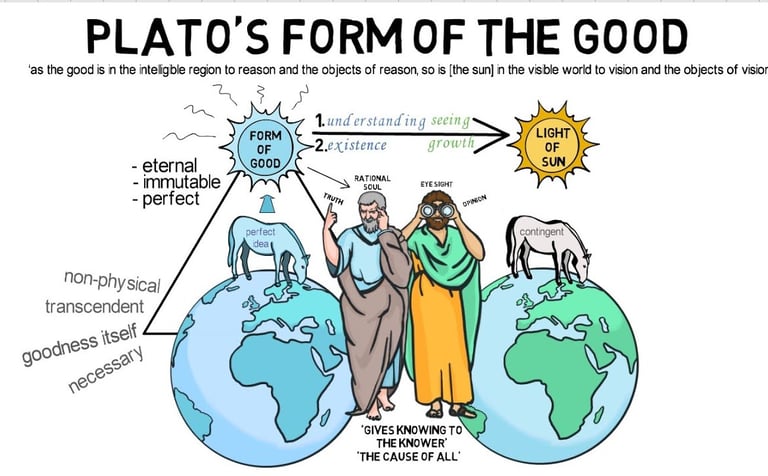UPSC Mains: Comment: 'Reality is a shadow of ideas'. (Plato) (1992)
Optional Subject: Political Science and International Relations
PSIR
7/29/20252 min read


🔹 Meaning and Background:
This statement reflects Plato’s Theory of Forms (Ideas) — the cornerstone of his idealist philosophy.
Plato, inspired by Socrates, believed that the world we perceive with our senses is not the ultimate reality.
Instead, eternal and unchanging ‘Forms’ or ‘Ideas’ represent the true essence of things.
The material world is merely a shadow or imperfect copy of these perfect Forms.
Example: All beautiful things we see (flowers, faces, art) are just imperfect reflections of the eternal Form of Beauty.
🏛️ Allegory of the Cave – Plato’s Illustration:
In his Republic, Plato gives the Allegory of the Cave:
Humans are like prisoners in a cave who only see shadows on the wall, mistaking them for reality.
True knowledge comes when one turns away from the shadows and sees the real objects casting them—the Forms.
Thus, ideas (Forms) are more real than the physical objects, which are ever-changing and perishable.
✨ Core Features of Plato’s Idealism:
Ideas are transcendental – they exist beyond space and time.
Immutable & eternal – unlike the ever-changing material world.
Accessible only through reason, not senses.
Forms are perfect models – e.g., "Beauty", "Justice", "Good".
Philosophy’s task is to discover these truths through dialectics and reason.
⚔️ Critique: Aristotle’s Rebuttal
Plato’s own student, Aristotle, offers a strong critique of this view:
🔸 1. Third Man Argument:
If a man resembles the Form of Man, and that Form also resembles a higher Form, it leads to infinite regression—making it logically inconsistent.
🔸 2. Form within the Object:
Aristotle rejects a separate realm of Forms.
He argues that essence (form) exists within the object itself, not in some distant world.
🔸 3. Empiricism over Idealism:
While Plato believes in pre-existing knowledge, Aristotle sees the mind as a tabula rasa (blank slate).
Knowledge comes from sense experience + inductive reasoning, not recollection of transcendent ideas.
🔸 4. Virtue through Practice (Phronesis):
Instead of contemplating eternal Forms, virtue for Aristotle is learned through habituation and practice—a more grounded and practical ethics.
🧠 Conclusion:
Plato’s assertion that “Reality is a shadow of ideas” highlights his commitment to philosophical idealism, where truth lies beyond what we see. While deeply influential in shaping metaphysical thought, it is not without limitations.
Aristotle’s more empirical and pragmatic approach offers a powerful counter, grounding knowledge in observable reality and reasoned experience, rather than transcendent abstractions.
Ultimately, Plato elevated reason and universals, while Aristotle championed experience and particulars—a debate that still informs Western philosophy and political theory today.